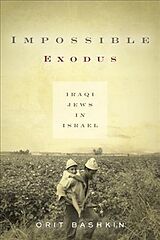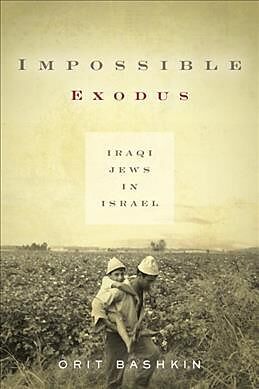Impossible Exodus
Einband:
Fester Einband
EAN:
9780804795852
Untertitel:
Iraqi Jews in Israel
Genre:
Geschichte
Autor:
Orit Bashkin
Herausgeber:
Stanford University Press
Anzahl Seiten:
320
Erscheinungsdatum:
15.08.2017
ISBN:
978-0-8047-9585-2
"Bashkin's project is humanistic at its core, weaving together both [Iraqis'] sufferings and their triumphs in fighting marginality and asserting their Mizrahiyut in a system that denied them a voice and recognition."
Autorentext
Orit Bashkin is Professor of Modern Middle East History at the University of Chicago. She is the author of New Babylonians: A History of Jews in Modern Iraq (Stanford, 2012) and The Other Iraq: Pluralism and Culture in Hashemite Iraq (Stanford, 2008).
Klappentext
Between 1949 and 1951, 123,000 Iraqi Jews immigrated to the newly established Israeli state. Lacking the resources to absorb them all, the Israeli government resettled them in maabarot, or transit camps, relegating them to poverty. In the tents and shacks of the camps, their living conditions were squalid and unsanitary. Basic necessities like water were in short supply, when they were available at all. Rather than returning to a homeland as native sons, Iraqi Jews were newcomers in a foreign place. Impossible Exodus tells the story of these Iraqi Jews' first decades in Israel. Faced with ill treatment and discrimination from state officials, Iraqi Jews resisted: they joined Israeli political parties, demonstrated in the streets, and fought for the education of their children, leading a civil rights struggle whose legacy continues to influence contemporary debates in Israel. Orit Bashkin sheds light on their everyday lives and their determination in a new country, uncovering their long, painful transformation from Iraqi to Israeli. In doing so, she shares the resilience and humanity of a community whose story has yet to be told.
Inhalt
Introduction: The Death of an Arab Jew
1. Human Material
2. Children of Iraq, Children of Israel
3. The Only Democracy in the Middle East
4. Elements of Resistance
5. Israeli Babylonians
Conclusion: The Death of Arab Jewishness

Leider konnten wir für diesen Artikel keine Preise ermitteln ...
billigbuch.ch sucht jetzt für Sie die besten Angebote ...
Die aktuellen Verkaufspreise von 6 Onlineshops werden in Realtime abgefragt.
Sie können das gewünschte Produkt anschliessend direkt beim Anbieter Ihrer Wahl bestellen.
Loading...
Die aktuellen Verkaufspreise von 6 Onlineshops werden in Realtime abgefragt.
Sie können das gewünschte Produkt anschliessend direkt beim Anbieter Ihrer Wahl bestellen.
| # | Onlineshop | Preis CHF | Versand CHF | Total CHF | ||
|---|---|---|---|---|---|---|
| 1 | Seller | 0.00 | 0.00 | 0.00 |
